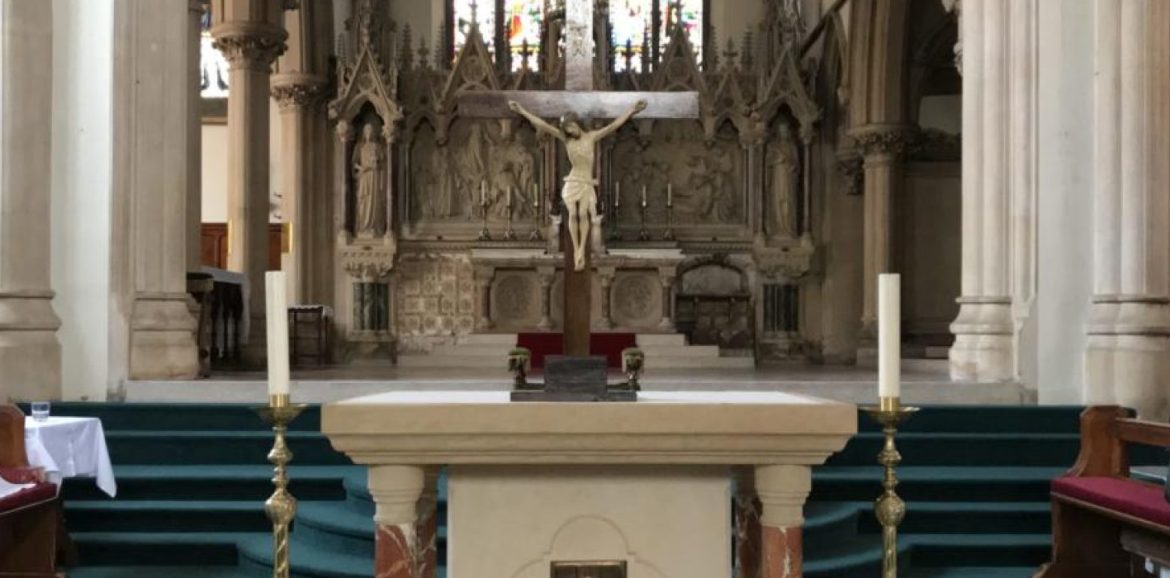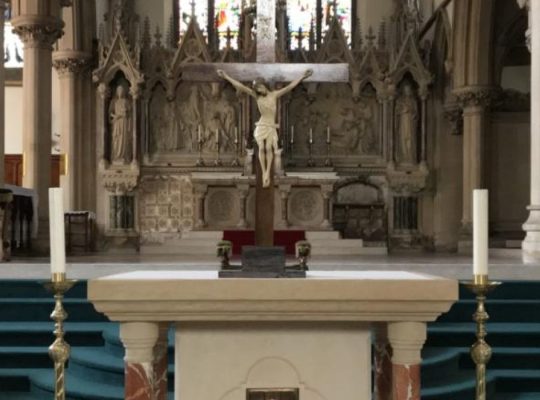The Lord Jesus’ resurrection marks the decisive turn in salvation history from the past to the present, which will last till Christ’s return. Before ‘the first day’ of this long week in which the world now lives, the Spirit was only in Jesus: his baptism at John’s hands in the Jordan showed this to the people. Given to all those who believe in him (Jn 7:39), the Spirit, transmitted through the risen Lord who was glorified by the Father, enables them to live as children of God. It gives the apostles the strength and courage necessary to become witnesses of the Lord in the world, and to preach ‘the forgiveness of sins….to all the nations beginnings from Jerusalem.’ Why then was it necessary to wait fifty days after Easter for the outpouring of the Spirit? Perhaps the Lord in his generosity gives us fifty days to feast after forty days of fasting, for he will never be outdone in his generosity, but I suspect there are other reasons too.
Granted, the communication of the Spirit to the first disciples and the Church cannot be separated from the paschal event. John knows he reports that, ‘on the evening of that first day of the week,’ when the Lord appeared to his disciples, ‘He breathed on them and said to them: ‘Receive the Holy Spirit. Whose sins you forgive are forgiven them, and whose sins you retain they are retained.’’ But, on that day, the disciples were in a house where ‘all the doors were locked.’ At Pentecost, the Spirit made them open the doors, speaking without fear to the people who gathered as ‘a noise like a strong driving wind’ filled the whole house. And this was a very public event, witnessed by many. At that point it was as though the apostles had a bucketful of grace poured over them by the Spirit enabling them to perform their ministry [Christ’s ministry] to the full. They were given the gifts and the fruits of the Holy Spirit and they remembered the promise of Christ ‘You shall perform greater works than this because I will send you my Spirit……’ ‘When the Advocate comes whom I shall send from the Father, the Spirit of Truth who proceeds from the Father, he will be my witness. And you too will be my witnesses, because you have been with me from the outset.’ And as we know great works indeed were performed.
On this ‘fiftieth day’ the Jewish festival of weeks was also celebrated—’Saba’ot— a commemoration of all covenants, from Noah to Sinai. One can therefore see the outpouring of the Holy Spirit on this day as the solemn promulgation of the new covenant and the birth of the Church. Shrouded in the secrecy of its paschal baptism, where the Spirit brought it to maturity, the Church blossoms on Pentecost, and it is quite clear that the fruits of the Lord’s passover surpass the promise of the buds.
Once again God reveals his mystery by what he does. After having spoken for so long through the prophets, God reveals himself as Father by sending his only Son to save the world. The gift of the Spirit inaugurates the last age by communicating to humanity the secret force that animates his life and the Son’s. ‘The love of God has been poured out into our hearts through the Holy Spirit that has been given to us.’ ‘For the Spirit of the Lord fills the world, and is all-embracing, and knows what man says,’ and through it God shows that he wants to communicate his love to all.
Baptism into the death and resurrection of Christ opens one to the action of the Spirit, ‘and where the Spirit of the Lord is, there is freedom.’ Nothing and no-one can prevent it from blowing where and as it will: ‘You can hear the sound it makes, but you do not know where it comes from or where it goes.’ (Jn 3:8) Born at Pentecost through the breath of the Holy Spirit, the Church cannot escape its impulse. The Church is constantly prompted to proclaim the Gospel to the whole world. If it should fall asleep, the Spirit reawakens it, sometimes rather brusquely; under the Spirits impulse, the Church, though thought to be ‘out of breath,’ renews its youth from age to age.
Each year on Pentecost Sunday we read the only account of the first manifestation of the Holy Spirit, reported in the Acts of the Apostles. The scene is so well known to us that we are easily tempted to listen to it rather distractedly. But if we pay close attention, it is clear that Saint Luke is describing a scene that does not easily lend itself to the imagination. The best icons and most successful pictures of Pentecost must be understood in the light of this text (Acts 2:1-11) as we hear today.
Lukes Gospel presents Jesus’ ministry in the framework of a long journey that begins in Nazareth, ‘Where he had grown up’, Jesus began his preaching and ministry in Galilee. Then the long journey to Jerusalem, into which Jesus makes his solemn entry and where, in the Temple he ended his ministry. After his passion, it is at Jerusalem that the risen one appeared to the apostles and gave them his last instructions. There he left them and was lifted to heaven after having ordered them to remain in the city till they were ‘clothed with the power from on high, to be his witnesses ‘in Jerusalem, throughout Judea and Samaria, and to the ends of the earth.’ Finally, it is at Jerusalem that the Spirit is given to the apostles and the first disciples. It is from the city where Jesus’ ministry ended that the universal mission will go out, as the Acts of the Apostles testifies. This carefully constructed montage underscores the continuity between the apostles’ and the Lord’s mission, the casual link between his passover, the blossoming of the Church and, after Pentecost, the proclamation of the good news to all nations.
This new theophany occurring ‘fifty days after Easter,’ during the Feast of Weeks, which commemorated the many previous divine manifestations, could only be a significant event of salvation (especially covenant) history.
In the desert of Sinai after the departure from Egypt, after having declared themselves ready to follow God’s prescriptions, the people led by Moses prepared for God’s manifestation. In ‘the upper room’ of the house in Jerusalem, a group of disciples were gathered: the apostles, with Peter their leader (The first among equals); some women, including Mary, the mother of Jesus, and some of his relatives. They all waited in prayer for the Holy Spirit that the Lord had promised them.
At Sinai, the mountain, burning like a furnace, trembled; there was thunder and lightning; a terrifying spectacle (Exodus 19:16-19) At Jerusalem, ‘suddenly there came from the sky a noise like a strong driving wind, and it filled the entire house in which they were. Then there appeared to them tongues as of fire which parted and came to rest on each one of them.’ But the manifestation aroused no fear in them.
‘And they were all filled with the Holy Spirit and began to speak in different tongues, as the Spirit enabled them to proclaim.’ The Old Testament notes that there were people who, seized by the Spirit, would suddenly find themselves in ecstatic and prophetic trances. Similar experiences occurred in the primitive Church. Though it is impossible to say exactly in what this gift consisted, it seems that it was both a charism of prophecy and a kind of spiritual delirium during which one praised God in a language that was incomprehensible, even to the speaker. The Christians at Corinth knew this charism and valued it highly. Paul, who had experienced it himself (1 Cor 14:18) and recognised its value—’I should like all of you to speak in tongues’ nevertheless, shows some reserve about it: ‘but even more to prophesy.’ At Pentecost some of the people at first thought the apostles were drunk. Peter’s speech showed that something quite different was happening. The noise ‘like a strong driving wind’ gathered a large crowd around the house. ‘They were confused, because each one heard them speaking in his own language.’ Here the apostles were not speaking atrandom, they spoke words that were perfectly intelligible to everyone in the crowd who all heard them in their native tongue. Just how could this happen? Clearly, it is a matter of little importance to us. On the other hand,, it is clear that Pentecost was the opposite of Babel. Following the confusion of languages, people were dispersed ‘all over the earth.’ At Pentecost, God gathered the people, ‘devout Jews from every nation under heaven’ who had come to Jerusalem for the Feast, the list of which symbolises the whole of humanity; and though they came from different cultures, which were not obliterated, there would be only one, universal Church, consisting of the communion of all the local Churches. Now, all of them, these people of many nations, were enabled to hear and understand the Word and celebrate the Name in their own tongue.
The story of Pentecost shows that the Church was born to be ‘universal.’ ‘The Spirit brought all the scattered peoples to unity and offered the Father their first fruits.’
The Christian Pentecost inaugurated the age of the Church ‘proceeding from the love of the eternal Father, founded by Christ in time and gathered into one by the Holy Spirit’ which dwells in it, like an internal principle of life and growth. By their preaching of the Gospel whose words it inspires and whose zeal it sustains, the Spirit excites faith and converts hearts. In the waters of baptism, it brings people to be children of God and the Church. It is by the Spirits power, that the bread and wine, fruits of the earth and the vine, become the body and blood of Christ, the sacrament of the new and eternal covenant, leaven of the Church’s unity, perfect worship of the Father to whom belongs all honour and glory. Through the other sacraments instituted by the Lord, efficacious signs of the Father’s love, the Spirit sanctifies the people of God. Sins are forgiven; the union of man and woman becomes a sign of the union of Christ and the Church. The sick are anointed with holy oils blessed by the bishop who receives his authority in his priestly ordination and given the grace to live through their trials. He gives his gifts and fruits in confirmation to his children.
The same Holy Spirit does not limit itself to sanctifying the people of God by sacraments and ministries, leading them and giving them the crown of virtues; it also distributes among all the faithful, ‘To each individual the manifestation of the Spirit is given for some benefit,’ the specialgraces that make one able to assume the various offices and charges that can develop the Church. ‘I still have many things to say to you, but they would be too much for you now. But when the Spirit of Truth comes he will lead you to the complete truth, since he will not be speaking of himself, but he will say only what he has learnt and he will tell you of the things to come. He will glorify me, since all he tells you will be taken from what is mine……’
‘Lord, send forth your Spirit, and renew the face of the earth.’
HAPPY FEAST!


